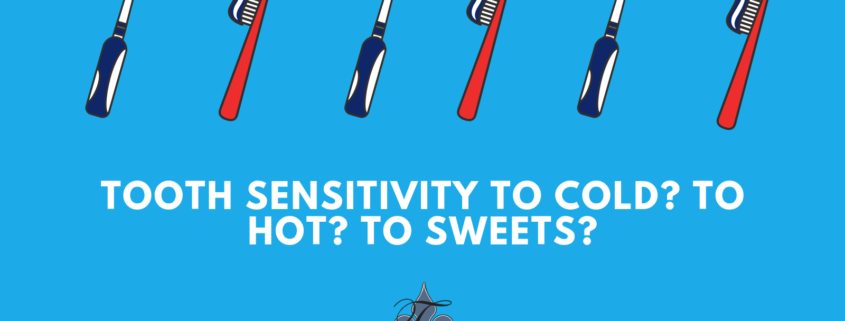Tooth Sensitivity to Cold? To Hot? To Sweets?
Ouch! We’ve all been there. You’re sipping a delicious latte or taking that first scrumptious bite of ice cream, and all of a sudden you feel jarring pain in a tooth or multiple teeth. Or, you’re nibbling on your favorite piece of chocolate when the same kind of pain appears, seemingly out of nowhere. What’s happening?
Not only is tooth sensitivity to hot and cold food, sweets and beverages painful, it’s also a sign of a bigger underlying problem.
What causes your teeth to be sensitive to hot, cold and sometimes sweet things?
There are multiple reasons why you might be experiencing the tooth sensitivity and subsequent pain or discomfort. These include:
- Erosion of your enamel: Your teeth are covered by enamel, which protects your pearly whites from things that are hot, cold, sticky or rough on your teeth. Over time, the enamel on your teeth can begin to wear down, putting you at risk for tooth decay and exposed nerves that make drinking and eating hot and cold things a very unpleasant experience. Enamel erosion is common as you age, but other contributing factors to losing enamel are a diet that’s too high in sugar, a diet that’s too acidic, or acid reflux.
- Cavities: Since a cavity essentially is a hole in your tooth or gums, it makes perfect sense that having one would expose sensitive nerves and cause pain when you eat or drink things that are hot, cold or sweet. Often, tooth sensitivity is one of the first symptoms of a cavity. Fortunately, cavities are easy fixes at your dentist’s office.
- Receding gums: Enamel is your first line of defense, but below that is dentin. Dentin is full of tiny tubes that make you more sensitive to hot and cold sensations. When your gum line is receding, the dentin has a better chance of being exposed, thus amplifying your sensitivity and pain. Receding gums are a sign of gum disease or gingivitis.
How can you alleviate tooth sensitivity?
If your tooth pain is caused by a cavity, the only real solution is to visit a dentist and have it filled. That should solve the problem of a sensitive tooth or teeth. The same goes for receding gums and being treated by your dentist for gingivitis or gum disease.
If enamel erosion is the issue, there are steps you can take on your own to slow the process. These include:
- Choosing your toothbrush wisely: If your teeth are feeling sensitive, opt for a soft-bristled toothbrush instead of a medium or hard bristle.
- Find a toothpaste that will help to restore your enamel and/or decrease tooth sensitivity.
- Don’t brush your teeth too hard! It’s one of the leading causes of tooth decay.
Whatever the reason for your tooth sensitivity, it’s not a good feeling, and you’ll want to get it taken care of. Contact Dr. Tim Chauvin’s office today for help.



